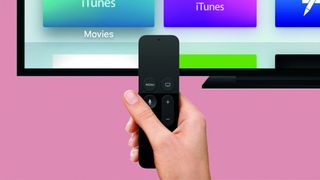Apple TV is continuing to decline but what’s going wrong?
Can Apple pull it back?

Despite its recent revamp, Apple’s attempt at a video streaming box isn’t having the best time. Not only was it roundly criticized in reviews, recent data from eMarketer shows that its sales aren’t picking up either.
According to eMarketer, Apple TV "is at the bottom of the U.S. connected TV market, behind Google Chromecast and Roku, with its share shrinking”. That’s got to hurt for a company that’s not exactly known for releasing unpopular products.
The company reports that in the US Apple TV is used by just 11.9% of connected TV customers, marking a steady decline from 12.5% in September and 12.6% in 2015.
Shrinking share
So what could Apple be doing wrong with its offering?
When the fourth-generation Apple TV launched in late 2015 it was a significant improvement on the previous generations of Apple TVs with its 1080p output, third-party apps, and speedy hardware. However, in the context of the wider streaming device market it just wasn’t good enough – and unfortunately that’s still the case.
The problem is that although Apple TV does the basics fairly well, the devices Google and Roku are offering do the same and more for less money. You can expect to pay around $149/£139 for a 1080p 32GB Apple TV, which is a significant sum when you consider that you can pick up a 4K Amazon Fire TV set-top box, or the 4K Chromecast Ultra for almost half that.
Keeping up with the competition
If you’re entrenched in the Apple ecosystem, own several iOS devices and buy all of your films and music from iTunes, the Apple TV is likely to hold some attraction for you. Otherwise, the other streaming devices out there are likely to draw you in first, as they’re more affordable and offer more content.
Get daily insight, inspiration and deals in your inbox
Get the hottest deals available in your inbox plus news, reviews, opinion, analysis and more from the TechRadar team.
Though Apple began working on introducing third-party apps to its device and continues to add more, it feels rather like too little, too late.
It’s also worth noting that Apple’s relationship with some of the most popular streaming services, like Amazon and Spotify, means it’s unlikely we’ll see them bring apps to the device any time soon, which puts Apple TV at a disadvantage when devices like Roku are able to offer more.
Not only that, Apple still isn’t able to offer the live TV subscription service it had originally hoped to launch. Increasingly we don't want to have to access apps to watch our shows; we want everything in one large diverse streaming ecosystem.

That market is now increasingly dominated by companies like Amazon, Netflix, and Hulu to the point where even if Apple does manage to pull together its own service, it may struggle to compete unless it’s able to offer something extremely attractive which these other services can’t.
Apple recently announced that it would up the maximum allotted size for apps on the Apple TV from 200MB to 4GB, which should make the device more appealing to game designers – although improved gaming options aren't likely to make the Apple TV more appealing to those looking for a TV streaming device.
Besides this, the Apple TV’s internal memory hasn’t increased beyond 64GB, so despite being able to hold bigger apps it won’t be able to hold many of them in its current form.
Is there hope?
This could, however, point towards a new generation of Apple TVs with larger hard drives on the horizon.
Though Apple clearly isn’t giving up on the Apple TV, it's highly unlikely that improving it is at the top of the company’s priority list.
Apple had a great vision for the Apple TV, going as far as calling it the “future of television”.
Unfortunately, while the Apple TV is undoubtedly a solid device in its own right, we haven’t really seen any sign of it being the future just yet.
Apple is making improvements – but so are its competitors, who were already offering more, which could make it hard for Apple to catch up enough to be considered serious competition.
Until it's able to offer a service that justifies its higher price point, Apple isn't giving consumers much reason to choose Apple TV over other streaming boxes.
Emma Boyle is TechRadar’s ex-Gaming Editor, and is now a content developer and freelance journalist. She has written for magazines and websites including T3, Stuff and The Independent. Emma currently works as a Content Developer in Edinburgh.
Most Popular


